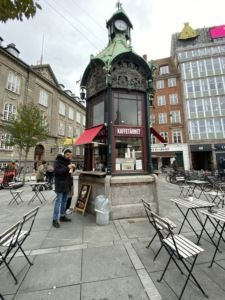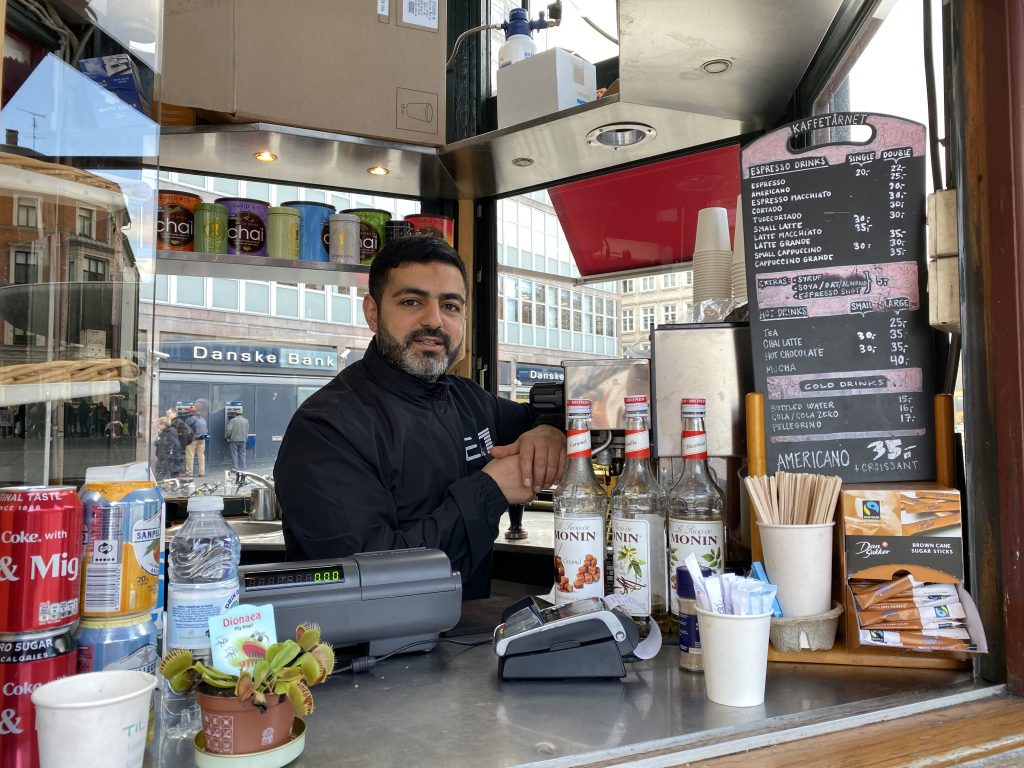Things to do
Wake up and smell the coffee: an authentic shop worth stopping by for
This article is more than 6 years old.
From what is very possibly one of the smallest coffee shops in the world, this multilingual barista takes pride in his knowledge of the beans and his customers

(All photos: Yuliya Kuryan)
It’s 11:30 on Nørre Voldgade – my favourite time of the day when my friends and I take a break from our Danish language class to get some coffee downstairs and chat.
We are closing in on the charming coffee shop Kaffetårnet.
Before I open my mouth, a friendly barista asks: “Cortado and a plain croissant?” I nod with a smile. He always remembers the favourites of his regular customers, and that list fortunately includes me.
Listening to the mechanical duet of the grinder and press – Abdullah fills my mug with an aromatic cortado.
Business in the booth
The story of Kaffetårnet started in 1896 when it began life as a telephone booth. Over the years, the booth served as a variety of shopping points, selling everything from newspapers to theatre tickets and more.
Long story short: today it is one of the smallest coffee shops in the world, situated in the centre of hectic Nørreport Station.
From 7 o’clock in the morning you can enjoy a cup of coffee with a crispy croissant or a swirl, delivered straight from a French bakery in Torvehallerne.
For almost nine years the place has been run by Abdullah Muhammad Abu-Lifa, who always wanted a small and charming coffee shop with few hassles.
“Big place = big problems. I don’t need this,” says the proud owner.
A universal language
Kaffetårnet is a gathering place for locals and tourists, and Abdullah enjoys building personal relationships with his customers. He believes that coffee is an international language that everybody understands.
“Here you can meet all kinds of people: from the homeless to politicians, news presenters and singers. Lars HUG, for example, one of the biggest Danish music legends, likes to come here from time to time by bicycle. And I believe that famous people appreciate that I am not fainting or giving them: ‘Oh, you are that guy!’ kind of attention,” contends Abdullah.
“In the end they are all humans; they could be having a good day or a bad day. And I am always trying to feel the moment: when I need to talk and when I don’t need to talk.”
Many of the customers, whom I got a chance to meet during this conversation with Abdullah, had come not only for the sake of a high-quality coffee, but also for the high-quality conversation.
“There is not so much soul in big coffee chains. Therefore I prefer to spend my money here,” one of the regulars told me.
Full of beans, sleepy kids
So what exactly makes a barista stand out? A key ingredient seems to be the ability to prepare beverages quickly whilst maintaining a high level of quality.
Abdullah maintains that a professional barista has the habit of tasting the coffee at the beginning of every working day in order to understand the bean’s behaviour and flavour profile.
“I start with a shot of espresso. I take around ten of them during the day, because my beans are living and I need to know the flavour and aftertaste of them all the time,” advises Abdullah.
“Throughout the day I also monitor the grinder. It should always be adjusted according to the weather temperature.”
The coffee-making process is a special ritual for Abdullah and his family. As a father of four, he often takes his kids to work, although the youngest one has the habit of falling asleep to the sound of the grinder!
Using his own example, the father teaches his children not only the skills of coffee making, but a form of communication that he believes leads to diversity and acceptance in society.
“Even though I was born in Copenhagen, sometimes I feel there’s pressure on people who don’t have a ‘typical Scandinavian skin colour’ – like mine. I am happy that just by being here, and working in this shop, I can remove a lot of prejudice – to show that people like me can be hard-working and well-educated,” he reveals.
“For example, I speak five languages: Danish, English, Spanish, Arabic and German. When tourists ask me for directions to attractions, I like replying in their mother tongue.”
Long live Kaffetårnet
Locals who haven’t visited Kaffetårnet as customers might have heard of it due to some recent media coverage.
In 2017 several journalists united to tell Abdullah’s story and support him, when his expectations of extending the lease contract with the municipality were questioned by officials.
The story ended on a positive note, when the mayor himself visited for a cup of coffee and a chat.
Abdullah now patiently waits for his contract to be extended again. Hopefully everything works out for Kaffetårnet, so this passionate local is able to pursue his business in the city, where a barista who appreciates the customer’s time and good coffee is highly valued.











































